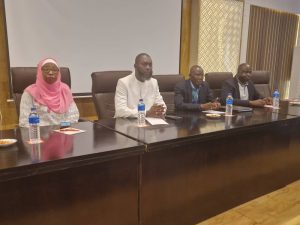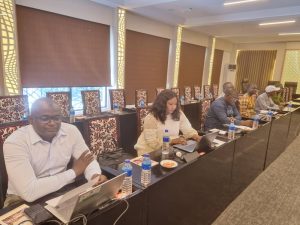In its unwavering commitment to sustainable development and responsible land management, the ROOTS project is taking a significant step forward by validating Environmental and Social Reports from its intervention sites. Spearheaded by the National Environment Agency (NEA), this crucial validation process is currently underway at the Bakadaji hotel in Kololi, bringing together key stakeholders from various government departments and research institutions. In this blog post, we explore the importance of this validation initiative and how it aligns with international standards to ensure a positive impact on both the environment and society.
Assessing Environmental and Social Impacts
Recognizing the importance of adhering to National Environmental laws and requirements, NEA recently conducted a comprehensive scoping visit to sixty ROOTS intervention sites spread across the six Agricultural Regions. The primary objective of this visit was to assess crucial background information related to each site, along with the potential social and environmental impacts arising from land development activities. By proactively evaluating these factors, the ROOTS project aims to gain valuable insights to guide its subsequent Environmental and Social Impact Assessment and formulate effective mitigation measures.
Environmental and Social Management Plan (ESMP)
The scoping visit carried out by NEA serves as a foundation for the development of an all-encompassing Environmental and Social Management Plan (ESMP). This comprehensive document will outline detailed strategies and actions to manage and mitigate any identified social or environmental risks. By having a well-structured ESMP, the ROOTS project can proactively address potential challenges and ensure that its interventions align harmoniously with the local ecosystem and communities.


ROOTS and IFAD’s Social Environmental and Climate Assessment Procedures (SECAP)
ROOTS proudly adheres to the guidelines set forth by the International Fund for Agricultural Development (IFAD) through its Social, Environmental, and Climate Assessment Procedures (SECAP). As a Category B Program, ROOTS is classified under Category B of The Gambia’s Environmental Impact Assessment (EIA) Guidelines and Procedures. This classification indicates that the project is expected to have limited environmental and social impacts, which can be effectively managed through appropriate preventive actions and mitigation measures, as outlined in both the Environmental and Social Management Framework (ESMF) and the updated ESMP of NEA.
Collaboration with Key Stakeholders
The validation process at Bakadaji hotel in Kololi brings together a host of key stakeholders from various sectors. Attending the event are NEA personnel, representatives from the Ministry of Agriculture, Ministry of Environment and Climate Change, RICAR project, as well as other relevant projects, UTG WASCAL, Department of Forestry, Department of Parks and Wildlife, Department of Water Resources, among others. This collaborative approach fosters inclusivity and ensures that a wide range of perspectives is considered during the validation process, thereby strengthening the project’s overall effectiveness and positive impact.
Conclusion
The ongoing validation of Environmental and Social Reports at the Bakadaji hotel in Kololi is a testament to the ROOTS project’s dedication to sustainable development and responsible land management. By proactively assessing potential social and environmental impacts and formulating a comprehensive Environmental and Social Management Plan (ESMP), ROOTS demonstrates its commitment to leaving a positive legacy for the environment and local communities. The project’s adherence to international standards, as well as its collaboration with key stakeholders, further strengthens its capacity to drive meaningful change and promote a brighter, more sustainable future for The Gambia.


